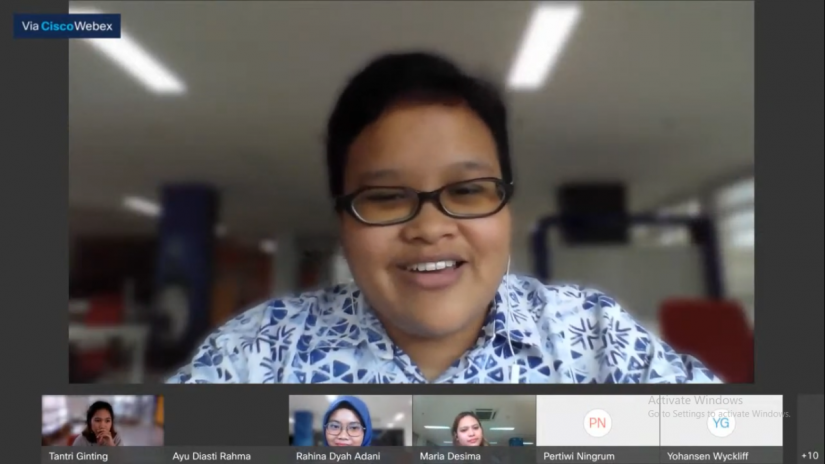
Yogyakarta, 29 Juli 2020—Fisipol UGM’s Community service (PkM) team held the third discussion through the Webex platform. The discussion raised the theme of “Jogjabregas.id: Adapting to the new normal through cross generation collaboration”. Jogjabregas.id is a platform funded by the FISIPOL UGM community grant. In that morning discussion, the speakers were Rahina Dyah, Tantri Friscilla, and Maria Desima with Ayu Diasti, an International Relations department professor, as the moderator.
Ayu Diasti, or better known as Ayu, spoke about the objective of the discussion which is to highlight young people’s role in facing the new normal. “That includes discussing about what is the current problem that we still have to face,” she added. Jogjabregas.id is one of the activity that is initiated by college students and that allows a cross generation collaboration.
Tantri or Tata, one of the content coordinator, talked about the creation of Jogjabregas.id. According to her, aside from the people who got covid-19, the effect of the pandemic is big in the day to day and community level. “A lot of people lost their jobs, others find it hard to adapt because they are forced to be familiar with the digital world,” she added. With a few professors, university students, activist, and artist, Karin started to talk about the best response to the pandemic. First, they focus on sharing masks, handsanitizers and food. Now, the next move to adapt to the new normal is Jogjabregas.id. “In the midst of the overload of information, people are getting confused. So, we want to make a site with information on how to adapt with concrete and relevant steps,” she elaborated.
“Bregas” is chosen because it’s a Javanese language which means healthy and strong. Rahina said that this choice of word is pretty familiar for Jogja citizens. But, on the other side, the word “bregas” symbolizes Rahina and friends’ hope in giving positive impacts to to the society, especially Jogja citizens.
To create a positive impact, Jogjabregas.id have three main contents in their Instagram and podcast. First, they have the Segar Waras (Healthy and Sane) department that respond to anxieties in the society. Tata as the coordinator of this departmentsaid that the aim of this department is to create information on how to take care of the health of our body and mind in the middle of the pandemic as well as reducing anxieties. According to her, the anxieties in the middle of this pandemic are not only about Covid-19 but the direct or indirect impact of covid-19 as well. This is why stress and mental burdens are high around this time.
The second one is Kampung Berdaya which focuses on Jogja village progress in responding to the Covid-19 pandemic. This content department is led by Maria who is an International Relations student at UGM. “In the start of the pandemic, the Jogja government moved fast. They start with implementing lockdown to working together with villages,” Maria said. This condition is proof that most of Jogja’s progress is done collectively. In this pandemic, a new collective solidarity arises which creates good stories that can make other people feel inspired.
Therefore, Maria and friends use podcast to deliver their stories to the people better. “We interviewed communities or organizations that did a great initiative in this pandemic,” Maria said. An example of a community they already interviewed is Meruang, an artist community. This community saw what Covid-19 medical workers and patients have been through. Based on this empathy, Meruang had an idea to create song playlists that can be played in hospitals to make medical workers feel happy and relaxed. They also invited friends from marginalized groups (people with disability, old people, shemale, etc) to share their stories on how they face the pandemic.
The third content department is Smart from Home (Pintar dari Rumah) which focuses on the education sector. Rahina, as the content coordinator expressed her worry on education in the middle of the pandemic. “We talk about how a good curriculum can be implemented in the middle of this pandemic,” she said. Even though most Jogjabregas.id members are university students, but they admit that there are a lot of practitioners that have more knowledge on the current condition and how an education should be run. Therefore, this content aims to collaborate with other people as much as possible.
One of the example of collaboration is with Sanggar Anak Alam School (Salam). Rahina said that Salam is one of the alternative school with a more contextual curriculum compared to formal schools. Rahina explained that in the middle of this pandemic, the curriculum should be more contextual which means that it is more relatable to students’ life at home. “This is done by Salam friends by giving (students) a task to research about food around their house,” Rahina added. Hence, every student can do the task without necessarily limiting their creativity.
Jogjabregas.id hopes that they can go on in the future. Members of jogjabregas use their privilege as a student with skills to share their stories and experience with other people. Nonetheless, in continuing this movement, Rahinda and friends still have some challenges to overcome. Rahina said that the challenge is how young people can be trusted by other generation to take the lead in being active and doing positive actions.
Other than that, Maria also explained that the fast changes in the pandemic makes the Jogjabregas.id team have to cover issues comprehensively and quickly so that Jogjabregas.id can stay relevant. Being quick and comprehensive is also important because we can’t predict what’s going to happen next. “But what is more important is how people can collaborate. It all started with an idea and when it is implemented, it can be really useful,” Maria said.
